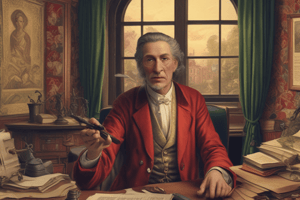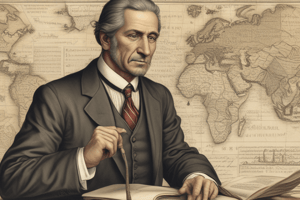Podcast
Questions and Answers
Which of the following is NOT identified as a core ethical obligation for historians?
Which of the following is NOT identified as a core ethical obligation for historians?
- Confidentiality.
- Respect for different perspectives.
- Promotion of national myths. (correct)
- Archival conservation.
According to Haecker (1985), what three criteria must a historical statement meet to be considered true?
According to Haecker (1985), what three criteria must a historical statement meet to be considered true?
- Alignment with current political ideologies, support from primary sources, and narrative coherence
- Popular acceptance, emotional resonance, and contemporary relevance.
- Subjectivity, interpretation and reliance on secondary sources
- Meaningfulness, verification by robust evidence, and reflection of a past state of the world. (correct)
What is the primary risk of ignoring contradictory evidence in historical analysis?
What is the primary risk of ignoring contradictory evidence in historical analysis?
- It leads to a more nuanced and complex interpretation of the past.
- It results in a distorted, superficial, or deceptive version of history. (correct)
- It simplifies the research process for historians.
- It reinforces established historical narratives.
How does a 'historical narrative' differ from 'historical truth,' according to Ankersmit (2010)?
How does a 'historical narrative' differ from 'historical truth,' according to Ankersmit (2010)?
France's 'civilising mission' is used as an example of what concept?
France's 'civilising mission' is used as an example of what concept?
What is a potential benefit of reinterpreting history?
What is a potential benefit of reinterpreting history?
Which action is identified as a way of addressing historical injustices, beyond reinterpreting history?
Which action is identified as a way of addressing historical injustices, beyond reinterpreting history?
What should historians do when faced with contradictory evidence?
What should historians do when faced with contradictory evidence?
Why is history considered crucial for societies, according to the provided content?
Why is history considered crucial for societies, according to the provided content?
Carr argues that history is NOT purely objective because:
Carr argues that history is NOT purely objective because:
According to the provided excerpt, what is Elton's view on historical truth?
According to the provided excerpt, what is Elton's view on historical truth?
How do human scientists contribute to societal evolution, according to the excerpt?
How do human scientists contribute to societal evolution, according to the excerpt?
Which of the following best describes the role of historians in society?
Which of the following best describes the role of historians in society?
Bonilla-Silva's work is mentioned in the excerpt to illustrate which point about human scientists?
Bonilla-Silva's work is mentioned in the excerpt to illustrate which point about human scientists?
What is the key difference in focus between historians and human scientists, based on the excerpt?
What is the key difference in focus between historians and human scientists, based on the excerpt?
Which of the following best describes a key challenge in the pursuit of transnational justice?
Which of the following best describes a key challenge in the pursuit of transnational justice?
What ethical obligation is emphasized for historians in the excerpt?
What ethical obligation is emphasized for historians in the excerpt?
Why is it ethically imperative for human scientists to prioritize the communication of empirical truth?
Why is it ethically imperative for human scientists to prioritize the communication of empirical truth?
How does the concept of 'color-blindness' function, according to Bonilla-Silva, and what is its impact?
How does the concept of 'color-blindness' function, according to Bonilla-Silva, and what is its impact?
What critical oversight led to the discrediting of the Stanford Prison Experiment?
What critical oversight led to the discrediting of the Stanford Prison Experiment?
In the context of historical and scientific research, what is the primary risk associated with disregarding contradictory evidence?
In the context of historical and scientific research, what is the primary risk associated with disregarding contradictory evidence?
Why can relying solely on contradictory evidence to form conclusions be problematic for historians and human scientists?
Why can relying solely on contradictory evidence to form conclusions be problematic for historians and human scientists?
How might governments justify objecting to the debunking of national myths, despite potential human rights violations?
How might governments justify objecting to the debunking of national myths, despite potential human rights violations?
What is a key difference between the ethical obligations of historians and human scientists when handling contradictory evidence?
What is a key difference between the ethical obligations of historians and human scientists when handling contradictory evidence?
What is the primary risk of ignoring contradictory evidence in historical analysis, according to the text?
What is the primary risk of ignoring contradictory evidence in historical analysis, according to the text?
How did contradictory evidence impact the acceptance of Ignaz Semmelweis's findings on the spread of diseases?
How did contradictory evidence impact the acceptance of Ignaz Semmelweis's findings on the spread of diseases?
What does a decolonial approach to history aim to achieve?
What does a decolonial approach to history aim to achieve?
In the context of historical analysis, what does the example of Christopher Columbus and the "discovery" of the Americas illustrate?
In the context of historical analysis, what does the example of Christopher Columbus and the "discovery" of the Americas illustrate?
According to the content, what is the relationship between acknowledging contradictory evidence and ensuring historical truth?
According to the content, what is the relationship between acknowledging contradictory evidence and ensuring historical truth?
The Holocaust is presented as an example of a factually established historical event. What type of evidence supports this claim?
The Holocaust is presented as an example of a factually established historical event. What type of evidence supports this claim?
How might historians' own perspectives and preconceptions affect their analysis of historical evidence?
How might historians' own perspectives and preconceptions affect their analysis of historical evidence?
What is the "moral duty" of historians and human scientists, as implied in the content?
What is the "moral duty" of historians and human scientists, as implied in the content?
Flashcards
Historical Integrity
Historical Integrity
Upholding honesty and accuracy in historical research and reporting.
Historian's Ethical Duties
Historian's Ethical Duties
Obligations include confidentiality, respecting diverse views, and preserving archives.
Criteria for Historical Truth
Criteria for Historical Truth
Statement must be meaningful, verified, and reflective of the past.
Contradictory Evidence
Contradictory Evidence
Signup and view all the flashcards
Historical Narrative
Historical Narrative
Signup and view all the flashcards
"Civilising Mission"
"Civilising Mission"
Signup and view all the flashcards
Historical Reinterpretation
Historical Reinterpretation
Signup and view all the flashcards
Reparations
Reparations
Signup and view all the flashcards
Transnational Justice
Transnational Justice
Signup and view all the flashcards
Debunking National Myths
Debunking National Myths
Signup and view all the flashcards
Telling Empirical Truth
Telling Empirical Truth
Signup and view all the flashcards
Color-Blind Ideology
Color-Blind Ideology
Signup and view all the flashcards
Situational Authority
Situational Authority
Signup and view all the flashcards
Misinformation
Misinformation
Signup and view all the flashcards
Unreliable Sources
Unreliable Sources
Signup and view all the flashcards
Do Not Ignore Contradictory Evidence
Do Not Ignore Contradictory Evidence
Signup and view all the flashcards
Historians
Historians
Signup and view all the flashcards
History as a Construct
History as a Construct
Signup and view all the flashcards
Objective History
Objective History
Signup and view all the flashcards
Human Scientists
Human Scientists
Signup and view all the flashcards
Color-Blind Racism
Color-Blind Racism
Signup and view all the flashcards
Ethical historical truth
Ethical historical truth
Signup and view all the flashcards
History as Dialogue
History as Dialogue
Signup and view all the flashcards
Holocaust Denial
Holocaust Denial
Signup and view all the flashcards
The Holocaust
The Holocaust
Signup and view all the flashcards
Ignaz Semmelweis' Discovery
Ignaz Semmelweis' Discovery
Signup and view all the flashcards
Miasma Theory
Miasma Theory
Signup and view all the flashcards
Eurocentric Narratives
Eurocentric Narratives
Signup and view all the flashcards
Decolonial Approach to History
Decolonial Approach to History
Signup and view all the flashcards
Aims of Decolonial History
Aims of Decolonial History
Signup and view all the flashcards
Study Notes
- Historians and human scientists have an ethical obligation to consider contradictory evidence to avoid biased findings.
Role Of Historians
- Historians document and interpret significant past events, which enables communities to learn from history and avoid repeating past mistakes.
- History is crucial for understanding global and local contexts.
- Historians search for historical truth in an honest way, with integrity as a moral foundation, even if subject to revision.
- Key ethical obligations include confidentiality, respecting different perspectives, and archival conservation.
Subjectivity vs. Objectivity
- Some believe history cannot be purely objective, complete objectivity is unattainable, it is an interpretation influenced by historians, a construct, not a definitive truth.
- Some believe objective history is attainable through empirical evidence and thorough research and that objective truth is historical truth
- Carr (1961) that "history is an ongoing dialogue between the past and present” (p. 30).
Human Scientists
- Human scientists (e.g., psychologists, anthropologists) are fundamental to society, like historians.
- Differently from historians, human scientists discover and understand how human society works.
- Their work allows for societal evolution and helps address social challenges.
- Ethical obligations include telling the empirical truth obtained through experiments and observation. Findings have an impact on human lives.
Importance of Contradictory Evidence
- For a historical statement to be retained as true, it must be meaningful, verified by robust evidence, and reflect a past state of the world.
- Historians must consider contradictory evidence.
- Ignoring evidence leads to a distorted, superficial, or deceptive version of history.
- Contradictory evidence is defined as evidence that implies two opposite things are true by providing evidence for two opposite sets of facts (Mandavilli, 2025, p.4).
Examples of Ignoring Contradictory Evidence
- France's promotion of its "civilizing mission" (mission civilisatrice) in Africa, Asia, and the Caribbean portrayed colonial expansion as a selfless endeavor of bringing ideologies and religion to non-European societies
- This portrayal is a historical narrative, not historical truth.
Historical Narratives
- Historical truth in narrative is frequently protected and shielded from criticism.
- Widely spread colonial historical narratives have been shaped by western power dynamics that continue to influence contemporary society.
- France selected and spread historical facts that aligned with its interests by minimizing or censoring contradictory evidence.
- Reinterpreting history can challenge national myths, create space for marginalized groups to have their stories told, and acknowledge past injustices.
- Besides revising history, reparations, i.e. transnational justice, is needed to reinstate justice and address historical injustices.
- Governments and citizens often object to debunking national myths because it challenges national identity and defends colonial policies.
Bonilla-Silva's Work
- Bonilla-Silva (2018) refutes the myth that racism is not a major problem and invalidates the color-blind concept, which promotes treating everyone the same and ignoring racial differences.
Clarence Thomas
- Justice Clarence Thomas advocates the color-blind ideology enforced in the U.S. Constitution.
Stanford Prison Experiment
- The Stanford Prison Experiment, conducted by Philip Zimbardo (1971), highlights the disregard of contradictory evidence.
- Zimbardo asserted that situational authority guides people to act brutally, but he ignored evidence that guards' behavior was influenced by him and that prisoners' reactions were exaggerated.
- Ignoring contradictory evidence led to the experiment being discredited.
Holocaust denial claims
- Holocaust denial claims are an example of false contradictory evidence used to contradict historical truth.
The Holocaust as a historical event
- The Holocaust, the systemic genocide of millions of Jews by Nazi Germany during World War II, is a well-documented event with survivor testimonies and Nazi records.
Ignaz Semmelweis's discovery
- Ignaz Semmelweis (1840s) found evidence that a lack of handwashing by doctors spread diseases.
- Contradictory evidence emerged, arguing that diseases spread through polluted air.
- Semmelweis's findings were later recognized as true, while the contradictory evidence was refuted, but the contradictory evidence had deadly consequences in the meantime.
Western Historical Narratives
- Western historians acknowledge contradictory evidence but are largely influenced by their own perspectives and preconceptions.
- Even when historians consider contradictory evidence, it does not guarantee historical truth.
- Vikings and West Africans had engagements with the Americas before Christopher Columbus (1942) but the historical narrative was that he "discovered" the Americas until historians have gradually moved away from eurocentric narratives and adopted a decolonial approach.
Bias in Historical narratives
- The decolonial approach to history aims to deconstruct historical biases established by colonial powers and reinstate neglected voices, indigenous epistemologies, and suppressed historical frameworks.
Conclusion
- Ignoring contradictory evidence leads to distorted or deceptive versions of history.
- Historians and human scientists have a moral duty to consider contradictory evidence.
- Taking contradictory evidence into account does not always ensure truthful statements, as dominant powers can manipulate them.
Studying That Suits You
Use AI to generate personalized quizzes and flashcards to suit your learning preferences.
Related Documents
Description
Explore the ethical obligations of historians and human scientists to consider contradictory evidence, avoiding biased findings. Understand the role of historians in documenting and interpreting significant past events, and dive in the debate of subjectivity vs objectivity.




